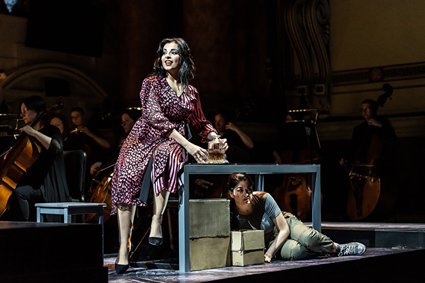| Opera Reviews | 29 April 2024 |
An unforgettable Aida where less is moreby Catriona Graham |
|
Verdi: Aida
|
|

Alessandra Volpe (Amneris), Alexandra Zabala (Aida)
|
|
|
Mention Aida and think elephants. Opera North, however, has proved that neither elephants nor a mammoth stage are required. The narrow strip of stage in front of the orchestra can contain all Egypt and the Nile if the singing and acting are strong enough. With its reputation for spectacle, it is easy to overlook how delicate the music can be; the overture is almost understated. The screen spools a black and white video of war-scarred buildings – Iraq? Syria? Gaza? – while a woman sleeps at one side of the stage and three people sit round a table at the other. Petri Lindroos has immediate impact as the priest Ramfis, his voice deep and rich, with an edge sometimes of authority, sometimes of threat. As Radames, Rafael Rojas’ tenor sounds light beside him; he grows in authority as his character develops. Amneris (Alessandra Volpe) is a smug princess, revelling in her power while prey to jealousy, with cause; Radames’ reaction when Aida comes in is a dead giveaway. So Amneris loves Radames, who loves Aida, her Ethiopian slave, and Ramfis has persuaded the King to appoint Radames to command the army to go and fight the Ethiopians who have invaded Egypt. The messenger who brought the news of invasion also brought a body, which is passed along the ladies of the chorus, who are sitting in the organ gallery of the Usher Hall. The chorus is excellent, their hands as voluble as their voices and their prayer to the great Ptah (Lorna James as priestess) is eerie. Amneris and Aida (Alexandra Zabala) are well-matched, and Amneris’ glee at tricking Aida into confessing her love is deftly done. And then come the trumpets. The benefit of concert performance is that there is less activity to distract from the music and nothing distracts from the trumpets. Radames returns, dragging a flag slowly on-stage and the Ethiopian king Amonasro comes on in white gloves. Mortar, stone, plaster? crumbles from his fingers, in imitation of the video above. Throughout, Michael Druiett’s King is more observer than participant. After the delicate strings of the third act overture comes ‘O patria mia’ – Zabala’s singing is deliciously liquid. Eric Greene (Amonasro) and Zabala catch the father-daughter tension of the situation, then Aida’s duet with Radames is delicate and nostalgic. Amonasro’s trick works – Aida gets the invasion route out of Radames and he has betrayed his country as she has betrayed his trust. By now, Amneris is no longer the spoiled rich girl, and Volpe’s portrayal of her anguish is very real. By the trial scene, with Lindroos and the chorus charging him and demanding his defence, Rojas’ shoulders slump lower and Amneris’ anguish is quieter, but greater. Meanwhile, we see Aida slip into the tomb. When his doom is pronounced, Rojas is ready and enters the tomb. The closing scene, as they feel their way – blind in the darkness – to each other, and then sit, not looking at each other but upwards, as if to light, is beautiful and touching. Conductor Sir Richard Armstrong, director Annabel Arden and chorus master Oliver Rundell have told, in an unforgettable way, the story of two people who loved each other to death.
|
|
| Text © Catriona Graham Photo © Clive Barda |
|







